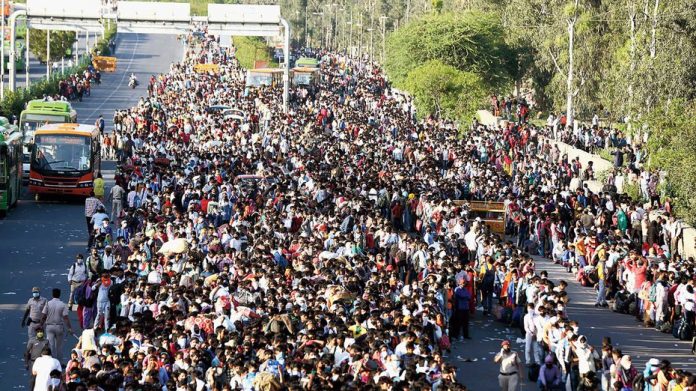This article is written by Meera Patel, from Maharaja Sayajirao University, Faculty of Law, Vadodara. This is an exhaustive article that covers the challenges faced by the migrant and informal workers during the COVID-19 pandemic and the lockdown.
Table of Contents
Introduction
With the escalation of the COVID-19 cases in India, the Modi government announced a complete lockdown in India on March 24th, 2020 and to protect the citizens from the fast-spreading deadly disease, the lockdown was extended thrice after the first lockdown. India’s lockdown guidelines were also considered one of the strictest lockdowns in the world.
Due to this extensively long lockdown, India slipped into a technical recession for the first time because of the pandemic and almost all the breadwinners of our country had to see financial problems in one way or another because of the pandemic. Loads of budding economic activities were halted which left millions of informal workers and migrant workers stranded, jobless, penniless and homeless.
Not only that, but approximately 122 million people lost their daily income in April alone and it devastated the working class as well as the overall economy of India. The Center for Monitoring Indian Economy (CMIE) stated that a total of 30% more people were unemployed by April 2020 than last year. Due to such a rapid fall in the employment graph, the government loosened up the labour laws a little and the parliament also passed three labour codes or three key labour reform bills that were supposed to create more job opportunities for the said victims of this situation.
Who suffered the most during the pandemic
Migrant workers
Migrant workers are people who migrate or move from their hometown to another city/ state/ country for the sole purpose of utilising the springing opportunities of labour work/ employment.
Informal workers
Informal workers are the workers who work as servants, household helpers, etc. These workers are from the informal work sector where they do not get the formal social security benefits that must be provided by the employers.
Homeless
Without any financial support, legal documentation or proof to prove their situation/ societal status or necessary resources, the homeless are also considered as one of the most vulnerable parts of our society.
Government’s actions
The most prominent measures taken by the government are the three labour bills that were passed down in the parliament in the spur of the moment to ensure jobs and employment to the citizens of India amidst the pandemic. The second purpose of these labour reform bills was to remove the obstacles which would hinder the process of winding up and shutting companies around the country. In simpler words, these bills would give a back up to the companies with up to 300 workers by allowing them to fire their employees without taking official permission from the government individually. The names of the above-mentioned bills are:
- Industrial Revolution Code Bill, 2020
- Code on Social Security Bills, 2020
- Occupational Safety, Health and Working Conditions Code Bill, 2020
Although the government cleared the new labour codes, their main intent of clearing the bills is to broaden the scope of providing social security to these informal sector workers and/ or the migrant workers while providing an open space for the hirers/ employers to fire their employees without taking the permission of the government. With the constant changes India observed in 2020 due to covid-19, our Labour Minister Mr Santosh Gangwar specifically said, “the sole purpose of the labour reforms is to provide a transparent system to suit the changing business environment”.
According to our labour minister, these bills are supposed to:
- Become a protective shield for the workers.
- Cater universal social security to all the workers (specific emphasis on the Employees Provident Fund Organisation and Employees’ State Corporation of India).
- Come up with a good amount of social security funds that would be used to supply resources to over 40 crore informal sector workers.
- Cover a lot of unattended problematic areas for the sake of the displaced workers as these bills are supposedly an amalgamation of 44 different labour laws consolidated into 4 labour codes.
- Occupational Safety, Health and Working Conditions Code Bill, 2020 will be an amendment to the laws that oversee the laws regulating the occupational safety, health and working conditions of the labourers/ employees.
- Code on Social Security Bills 2020 is supposed to change the laws that oversee social security. It is also supposed to expand the ambit of the social security of all the employees regardless of the fact if they belong to the formal or the informal sector.
- Industrial Revolution Code Bill 2020 is supposed to amend the laws that oversee relationships between trade unions, the job environment/ condition of the workers in any form of industrial setting. It will also allow the government to undertake investigations and provide settlement deals in cases of industrial disagreements.
- One more bill which has already been passed down the parliament is the Code of Wages Bill, 2019. This bill is a passageway for the other three bills to pass down the parliament.
Code on social security, 2020
As mentioned above, the Indian labour ministry has weaved up the 4 codes to improve the working conditions and provide social security to migrant workers, gig workers or labourers from the informal sector of our economy.
The government has taken various other measures to cater to the plight of the workers in the unorganised sector. The Social Security Code will be used as a replacement for 9 social security laws. Some of those already existing laws are:
- Employees Provident Fund Act, 1952
- Unorganised Workers Social Security, 2008
- Maternity Benefit Act, 1961
This amalgamation constitutes the Social Security Code Bill which was in the first place raised to become a welfare benefit scheme for things like pension, medical care, disability benefits of the working class of the unorganised sector, gig workers, etc.
Almost after 75 days of declaring the lockdown, the government introduced and gave a green light to start the railways only for these migrant workers in the form of shramik trains so that they could at least reach their home state and could access temporary ration supplies. While the government was busy setting up such temporary and immediate relief measures, the long term measure structures that were supposed to help these workers were ignored in the first place.
Lastly, the Ministry of Health and Family Affairs along with the State government-financed and arranged for relief camps for these migrant workers so that they can access some basic amenities such as food, water, sanitation and medical services. Many other initiatives such as the Atma Nirbhar Bharat, PM Modi Fund, etc were introduced to the country and its citizens during the lockdown.
Challenges faced by migrant workers
Along with all the problems of the migrant workers, the lockdown too proved to add to the misery as well as the poverty of the labourers. The current pandemic shook millions of labourers due to the loss of their one-way income, houses, occupations/ jobs, families and their already non-existent nutrition vulnerability.
The lockdown which was imposed on the whole country at very short notice at the end of March last year and it played a major role in instigating economic, social and gender inequalities. Due to the strict nature of our house quarantine policies laid down by the government, millions of migrant workers, labourers got stuck in the cities they had migrated to without a roof, protection, money, job or even the most necessities. The scale at which the problems and severity of problems these people were pushed into shook the nation. It also led them under the limelight of the policy and public attention.
Overseeing all the statistics, the need for separate legislation to address all plight of the migrant workers has been hovering over the heads of the government for a very long time as the workers of this marginalised community have suffered enough especially during the year 2020. The workers have been demanding separate legislation due to administrative, political and fiscal interference. Due to these political interferences, the migrant workers were fired from their jobs and homes, leaving them to fend for themselves without food, wage, residence during the lockdown.
Even though this was a very traumatic experience for over 300 million migrant workers in India, this experience should be taken as an example to understand the complications and problems of our labour laws by collecting specific statistics and data to understand the vulnerabilities of the migrant workers. The recent calamity of such unprecedented proportions was an opportunity to understand the specific vulnerabilities of migrant workers and collect nationwide data on their precarity. Listed below are a few problems that need some immediate attention from the government:
Increase in informality
A survey done by the World Bank reported that “the COVID-19 is biased against informality”. In simpler words, the report has stated that workers of the informal sector have suffered a very sudden economic fall due to the loss of employment and their households have suffered the impact of this sudden unemployment as poverty was already a huge factor pulling them down anyway. Even after the continuous extension of the lockdown started to halt, these informal workers were not able to secure their jobs back as not only to them but this pandemic has taken a toll on the whole economic structure of our country.
A well-known economist and senior at the Indian Council for Research on International Economic Relations (ICRIER) have stated that “the unemployment rate declined but the decline in open unemployment rate masks the problem of unemployment” and “several of those rendered jobless in the formal sector, who cannot afford to remain unemployed will try to seek or create work in the informal sector because there is no unemployment insurance or income support from the government”.
As per the aforementioned report provided by the World Bank, informality has been a root cause of such problems in India for a very long time. Out of the 61 million jobs created over the years due to the liberalisation, 92% of those jobs were counted under the informal sector and that is why the workers of the informal sector took the hardest blow last year. Approximately, 12 million people in India who lived above the poverty line until 2019 were pushed under the poverty line in 2020 due to the pandemic and lockdown
No social security
Keeping in mind the labour codes passed by the parliament that was mentioned above, which were made to simplify and modify the already existing labour laws are now being quoted as the ‘game changer’ by the parliament.
But these apparent modern and simplified labour codes backfired on the government as the labourers started a protest against these bills as they were ‘anti worker’. The industrial relations labour code would now allegedly allow the employers to hire and fire their workers more easily as they wouldn’t need to take the permission of the government to do so.
The protesters have been arguing that these changes provide no safeguard to their entire community and it also will make it harder for them to survive when getting a job to make their ends meet is super important to them right now. The code on wages has allegedly watered down some very critical provisions that were necessary for wage protection. It is also said that these changes will soon become the reason why the pro – workers’ legislation, trade unions and workers’ organisations would reach a screeching halt. As for job security, these labour codes might dilute the chances of getting better job security for all the labourers who belong in the informal sector.
Definitional clarity
The lack of definitional clarity in these labour codes has proved to be a problem. For example, the code related to providing social security defines workers such as food delivery agents, cab drivers etc. Although the same code mentions these gig workers as workers under the unorganised sector at the same time, these gig workers also put down extra hours to receive some inadequate work benefits as they aren’t paid enough for their work they do. Cab aggregators and food delivery apps such as OLA, Swiggy, Uber, Zomato have been ranked as the lowest on the scale of fair work, fair pay, fair conditions, fair management, fair contract and fair representation scores as per the Fair Work Ratings 2020 on labour standards in the platform economy.
The definitions of these gig and platform workers is not very clear in these codes which makes it very ambiguous. The definition of self-employment and dependent employment is yet another topic that is very ambiguous. Therefore, definitional clarity is one of the main things the parliament needs to put light on.
Lack of investment
According to the research and reports given by the PRS Legislative, 12 states relaxed their rigid labour laws and increased the maximum daily and weekly working hours for the migrant workers as an attempt to restart the industrial activity by May and June 2021. The Labour Ministry has also suggested increasing the daily working limit from 10.5 to 12 hours which will also include an extra hour as a rest period for the workers. This idea has already been drafted in the Code on Occupational Safety, Health and Working Conditions but it also highlighted that no worker will be allowed to work for more than 48 hours per week.
Observing all the extensions and rules stated in the newly modified code, the International Labour Organisation has expressed its deep concern for the same as even though the government has cleverly extended the potential working hours of the workers by attempting to improve the condition they had to go through, it still might not be the best solution to the migrant workers’ plight.
Rights of the migrant workers
Interstate Migrant Workmen (Regulation of Employment) Conditions of Service Act, 1979 was enacted because of the inefficient provisions which were provided in the old statutes of Contract Labor (Regulation and Abolition) Act, 1970 which could not help the government to pull out issues related to malpractices done by the principal employer, contractors etc. Listed below are the rights of the interstate workers under this particular act:
- Equal wages should be given to workers for similar nature and duration of work performed.
- The wages of these migrant workers shall not fall below the limit of minimum wage fixed by the Minimum Wages Act, 1948.
- As per Section 14 of the Interstate Migrant Workmen (Regulation of Employment), Conditions of Service Act, 1979, these migrant workers are allowed to receive displacement fees that can amount to up to 50 % of their monthly wages.
- As per Section 15 of the Interstate Migrant Workmen (Regulation of Employment), Conditions of Service Act, 1979, these migrant workers are entitled to receive an allowance for their journey back home which must also include the wages of the days they take leave.
- These migrant workers have the right to file a complaint against their employers to the authorities within three months of being the victims of any accident or incident, etc.
- Lastly, these workers are also entitled to receive other free of charge mandatory facilities such as accommodation, medical facilities, protective clothes, protective shields etc.
Government’s role
In a democracy such as ours, the concept of the welfare state manages to triumph as one of the most important requirements. India being the world’s largest democracy rigorously adheres to the socio-economic welfare of the people as it is the prime task for the lawmakers of our country or a democracy. The basic duty of the Constitution of India is to ensure the basic social and economic rights of their welfare.
Article 41 of the Indian Constitution of 1941 states that “in right to work, to education and public assistance in certain cases, the state shall within the limits of its economic capacity, and development, make effective provisions for securing the right to work, to education and public assistance in cases of unemployment, old age, sickness and disablement and in other cases of undeserved want.”
Part IV of the Constitution of India deals with the Directive Principles of the State Policy where the government prompts the labourers to cooperate with them so that the government can help them secure their right to work and their right to public assistance in cases of unemployment.
Even though the government of India has tried to fulfil the needs of these migrant workers, I still feel that they haven’t done enough and the rights mentioned under Article 41 of the Indian Constitution has been violated as the workers neither got assistance in securing a job nor did they get any other permanent solution after the pandemic hit India.
The callous response given by the government to these migrant workers have resulted in a very disastrous situation for the migrant and informal sector workers around the country. The systematic and structural reasons that caused such distress to the workers was and is still being completely ignored by the government since the lockdown started in March 2020.
Steps taken by the government during the lockdown
The economic and social imbalance that has broadened in the society since the lockdown began last year has managed to drown the weaker section of the society underwater. Their struggle to survive has been the loudest.
With all the protests and immediate steps taken the workers as well as the government managed to bring the judiciary in the picture once again. The judiciary had to step into the scenario to protect the rights of the migrant labourers. In the case law Harsh Mander vs. Union of India, the prosecution filed a writ petition in the Supreme Court of India where the petitioners wanted an assurance from the SC for the payment of the wages to the migrant workers during the pandemic.
Although the judiciary was brought in the middle of the government and the migrant workers to bring out a solution, the SC declared that the petitioners should look into the reports submitted by the government and they refused to interfere in State policy matters. The writ was later disposed of on 21st April 2020 when Solicitor General Tushar Mehta filed a status report. In the report, he highlighted the fact that a helpline had been generated so that immediate relief could be provided to the migrant workers whenever needed.
Later on, the Supreme Court of India took Suo Moto’s cognizance and gave out new directions for the “Re: Problems and miseries of Migrant Labourers” so that the pain of these workers could be alleviated a little. Listed below are the measures that were supposed to direct the State as well as Central Government:
- To make sure that the estranged workers must be transported to their home state within 15 days from the order date.
- To formulate more effective employment schemes so that a source of livelihood could be provided in their native places.
- To provide a list of all welfare schemes to the workers so that they are aware of all the options.
- To withdraw any and every complaint filed against the migrant workers for violating any norms set up by the government during the lockdown period who were trying to get back to their home states.
Possible solutions
Although some of the solutions and steps taken by the government did provide temporary and immediate relief to the migrant workers most of them managed to instigate these workers against the government. Listed below are a few possible solutions that could help and make the situation a little better for the affected migrant workers. To deal with the current situation, the government might need to highlight and emphasise its efforts on:
- A strong need for a powerful communication source is necessary so that all the problems of these migrant workers can be heard by the government without being blocked in the tangles of politics. This might also help the government to express the various welfare and benefit schemes made by the government for the migrant workers out loud and with clarity.
- The prevailing panic among the migrant workers due to the pandemic can be suppressed through awareness campaigns especially in areas where the concentration of these workers is high. These campaigns will become a source to clear out the myths related to the coronavirus and also help them take correct precautions.
- The MGNREGA program (Mahatma Gandhi National Rural Employment Guarantee Act, 2005) can play the hero in this situation for the migrant workers who have already returned to their homes as this will help them earn their daily wages to meet their two ends.
- The local government can seek the help of the state government to create and collect enough data related to the migrant workers so that their vulnerabilities and situation could be mapped out and traced accordingly.
- Lastly, there is a roaring and immediate need to extend and spread out the medical facilities so that both, the physical as well as mental health of these labourers could be in check as the lockdown has managed to create some pretty difficult situations for the weaker and informal communities of our society.
Conclusion
The lockdown implemented on the whole country due to the spread of COVID-19 pushed into a technical recession and all of the countries had to face financial issues especially the migrant workers and the informal workers as they were the ones who were away from home without a payroll, family, food, job or a roof over their heads.
Despite the measures taken by the government, the challenges faced by these workers are far more serious than imagined therefore, these migrants have next to no faith in the system as of now. Although they got grants to go back to their hometown, without a job or money they have lost all their hope. Some are even making their working ends meet by the last of their savings but it will also exhaust in some time if the labour force is not given the aid they need and deserve.
References
- https://thewire.in/labour/india-labour-legal-system-migrant-workers
- https://www.business-standard.com/article/economy-policy/need-worker-protection-migrant-data-will-labour-laws-drive-job-creation-121010400147_1.html
- https://link.springer.com/article/10.1057/s41287-020-00326-4
- https://blog.ipleaders.in/social-security-covid-19-india/
LawSikho has created a telegram group for exchanging legal knowledge, referrals and various opportunities. You can click on this link and join:
 Serato DJ Crack 2025Serato DJ PRO Crack
Serato DJ Crack 2025Serato DJ PRO Crack












 Allow notifications
Allow notifications


